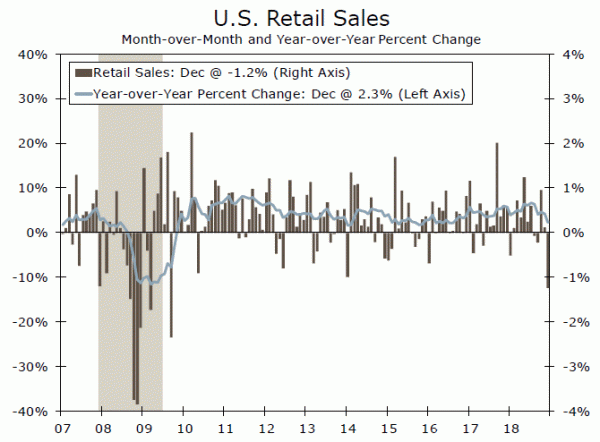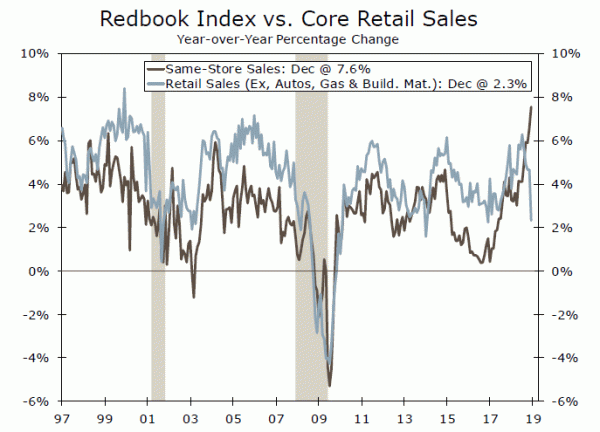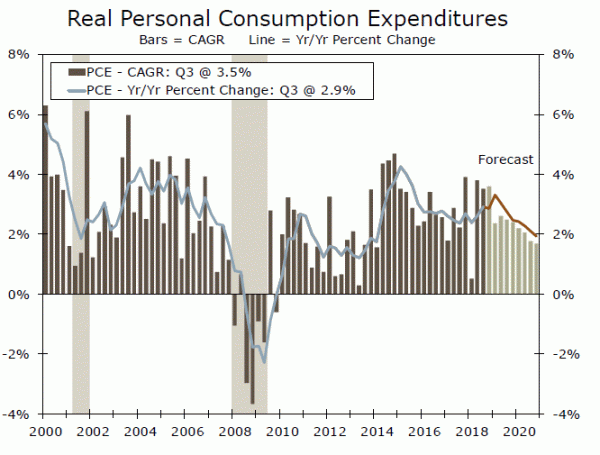Retail sales unexpectedly plunged 1.2% in December. The fact that this was not the usual collection process opens up potential issues that make us wary to believe that consumer spending is collapsing.
Not a Clean Read
We have a dose of skepticism regarding today’s reported drop in December’s retail sales. The weekly Redbook index for same-store sales was up more than 6% for every week in December. To put an exclamation point on that, the 9.3% year-over-year increase in same-store sales in the final week of 2018 was the biggest on records that date back to the mid-1990s. That looks at odds with control group sales falling 1.7% in December to end the year up only about 2.0%.
The Redbook survey measures sales at brick and mortar stores, representing over 80% of the Department of Commerce’s official retail sales report in regards to dollar value. But the country’s biggest online retailer, Amazon, also reported record holiday sales. That is hard to square with non-store sales, i.e., online sales, falling nearly 4% in December.
The weak numbers could be a function of consumers continuing to shift their holiday shopping to November, when control group sales rose 1.0%. But, we think that issues surrounding the government shutdown may be at play. The Department of Commerce noted in its release that “data collection and processing were delayed.” It is possible that later collection led respondents to incorporate more of their January sales, which is typically the slowest month of the year for retailers. With seasonal factors expecting a jump in December, the adjusted numbers were depressed more than usual.
Every category of retailers, besides motor vehicle dealers and building materials, saw a decline in December. While some declines can be reasoned, and were even partially expected, like the price-related decline at gasoline stations, we are having difficulty squaring declines elsewhere, such as the 3.9% drop at non-store retailers.
While “processing and data quality were monitored”, the fact that this was not the usual collection process opens up potential issues that make us wary to believe that consumer spending is collapsing. Even excluding volatile components, such as food services, autos, gas and building materials, control group retail sales declined 1.7%, the largest month-over-month decline in the series since 2000. This sales group feeds directly into the Bureau of Economic Analysis’ calculation of personal consumption expenditures (PCE). But while this measure represents the sale of goods, and with two-thirds of consumer spending stemming from services, we do not expect the December print to completely weigh on PCE in the fourth quarter. That said, even if revisions are in order for December sales, this number will show up in the Q4 GDP release, and we will likely have to modestly cut-back our expectation for a 3.6% annualized pace of PCE in Q4.
This morning’s release suggests the economy entered 2019 with less momentum than we previously expected. However, with much of the release hard to square with other variables, we expect revisions may be in order, and are wary to believe consumer spending is collapsing.



